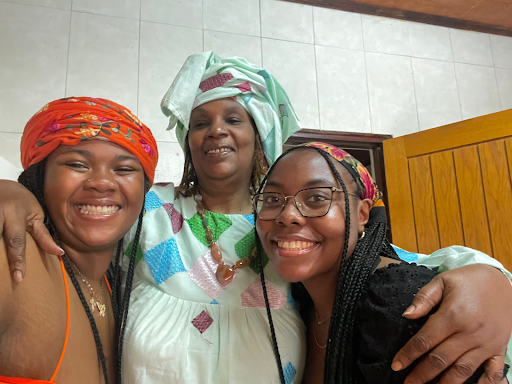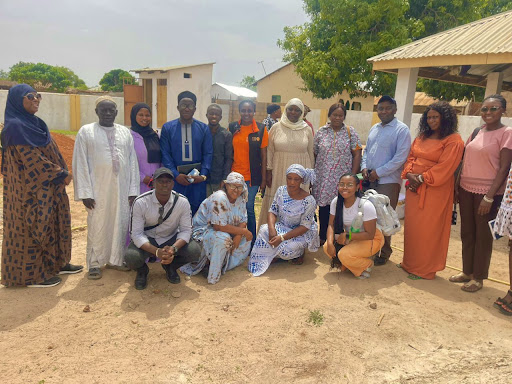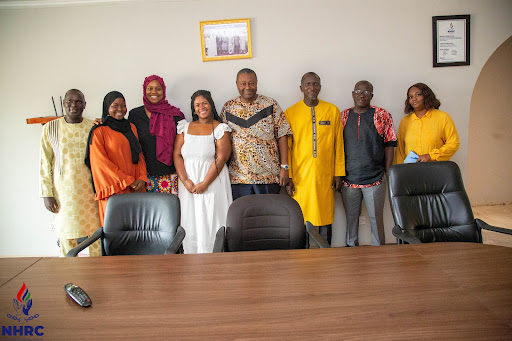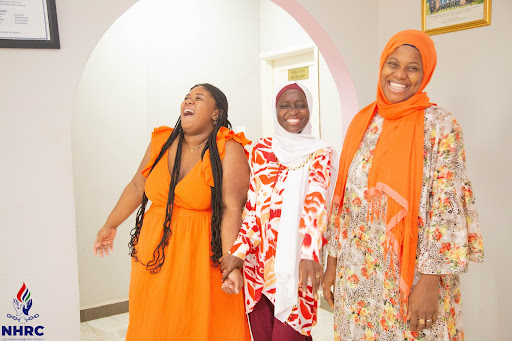Let's Talk Human Rights

2023 Summer Fellowship: Seeing The Gambia Through Different Eyes
By Sierra Cook '23 & Ahmi' Moore '24
Sierra's Experience
I am a UD Alumnae with a degree in Health Science and a minor in Psychology. As this internship is under the human rights center, you’re probably wondering why nothing in my degree has the words Human Rights in it. One day I was in (MEC) the Multiethnic Education and Engagement Center when Mercy John ran into MEC asking anyone if they wanted to do a 2-month internship in Africa for the summer when I was relaxing with some friends and said “I’ll do it” on impulse. I then had second thoughts and was like maybe I shouldn’t go to my friends that were there with me and they quickly encouraged me to do it and said it would be a great opportunity. I convinced my parents to let me go to Africa for 2 months in the span of a week right before graduation. It was stressful but my parents ended up being on board and I raced to get everything filled out and in order to go.

Once I arrived in The Gambia I could not believe that I was actually there. It was kind of a surreal experience because it was my first time being in Africa. The first week mostly consisted of me getting adjusted to the time difference and weather. Everyone was very kind and coming from the U.S. I wasn’t used to everyone being like that without a motive. After that week I didn’t know what to expect or how I would adjust to the work environment but it ended up going quite well. That week I met all of the staff on my first day and went to other offices in ActionAid The Gambia to meet the other staff members who worked for different organizations. The first week at (NGBV) The Network Against Gender-Based Violence was very calm. There were no ongoing projects at the time so most of my days for the first two weeks were spent doing mostly clerical work when assigned or talking to the other intern in the office Ida. In the beginning, one of the most difficult parts of being here was the language barrier. I looked on Google and it said mostly everyone spoke English here so I didn’t even think anything of it until I was surrounded by locals who spoke the local language Wollof. It also is a verbal and non-written language so it was harder for me to understand at times but as time went on I began to pick up phrases here and there.
I also experienced a culture shock in some ways from eating lunch together in one big bowl at work. I attended some meetings while I was here which were very eye-opening, one specifically about laws on (FGM) which is female genital mutilation or in other terms female circumcision. I never heard of it before coming here and the various implications it had on women’s health but hearing survivors talk about their experiences was eye-opening although it was a cultural custom there that they are trying to eradicate. One meeting consisted of me taking a 30-minute ferry to Kerr in The Gambia and the meeting was almost completely in Wollof so it was a cool experience.
I also made social media accounts for NGBV and trouble-shooting not being able to log in to accounts at first because I’m from the U.S. and realized I needed to use a VPN to access them and did various other clerical tasks I had never done before like making a concept note, or organize their annual report, etc. Besides going to work I read at the beach and watched sunsets, tried cultural dishes, went dancing, and to karaoke (which was less frightening than I thought it would be).
The very first time I heard about this fellowship opportunity I was in a (DPE) Diversity Peer Educator meeting when Dr. Satang Nabaneh came with a colleague to do a presentation for us and do an activity. I remember sitting there and thinking to myself, “I really wish they had something like this before it was time for me to graduate”. Looking back God already had a plan for me to go before I even knew and I am so grateful to have had this opportunity and to be able to share my experience with you.
Ahmí’s Experience
Before this internship, I had never had the opportunity to go abroad. And while I have had the chance to experience a series of different placements that were far from home, none of them could have fully prepared me for traveling across the ocean.

When I found out I was to work with the National Human Rights Commission of The Gambia (NHRC), I went through a range of emotions. I was thrilled and nervous, but I knew that this experience was going to be life changing so I pushed past those feelings. And I’m so glad that I did because my journey this summer was one I’ll never forget. Being able to witness first-hand the world of politics and human rights in another country was surreal and eye-opening. Since working with the NHRC, I have gained so much perspective on human rights as community centered. That, especially when discussing development, human rights is about more than addressing the state and its government but it’s about reimagining a society that finds its strength and success in the uplifting and care of people. Nonetheless my internship gave me more than a developed mindset and improved professional skill set, I gained another family.
Being away from home was certainly an adjustment, but my host family and even the family that I’ve gained while working at the NHRC made my transition from the US to The Gambia so much easier. From the time I stepped foot into their home they welcomed me with open arms. They ensured that my stay cultivated a personal understanding of the culture. I was able to try traditional foods from Palasas, to Benachin, to Baobab juice (a fruit Native to The Gambia). Learn and cook a few recipes like beef pies and shawarma! Engage with all different types of communities from urban Serrekunda to rural Janjanbureh. Visit markets to explore more new foods, fabrics, scents, and jewelry. Relax on beautiful beaches, dance to traditional music, and sing badly at Karaoke with friends and other locals. And even learn a few useful phrases in Wolof and Mandinka (two of the many languages native to The Gambia).

I didn’t feel othered but the exact opposite, I felt a strong sense of belonging and I know that's a product of the deep sense of family that’s ingrained in Gambian culture. Gambia is known for being “The Smiling Coast” and after living there for two months you start to realize just how true that statement is. All in all, The Gambia was truly remarkable. This opportunity has left me so grateful and transformed. I’ve never felt so far away yet close to home and if I could do it all over again I would change absolutely nothing.
Sierra Cook is a recent graduate with a Bachelor’s of Science in Health Science and a Psychology Minor. She is a Cleveland, Ohio native and she was involved in various student organizations on campus. While completing her degree at UD she was the African-American Committee Chair for the Multicultural Programming Council (MPC), and the Social Media Coordinator for Womanists Empower (WE). She was also apart of the Diversity Peer Educator Program (DPE), P.E.E.R.S mentorship program and a general body member of Black Action Through Unity (BATU). Her future plans are to work in the healthcare field and gaining clinical experience before pursuing her graduate studies in Public Health or Medical/ or PA School.
Ahmi' Moore is a senior human rights studies and english major from Xenia, Ohio. As a Human Rights Center student-intern, Ahmi' focuses on furthering anti-trafficking efforts, housing justice, and racial and gender inequality. Through this experience, she hopes to gain more knowledge that will serve her dream of starting her own nonprofit organization focused on advocacy surrounding Gender Based Violence (GBV) and engaging in international NGO work . After graduating, Ahmí plans to attend graduate school to pursue a degree in International Affairs, Conflict Resolution, and Civil Society Development.
